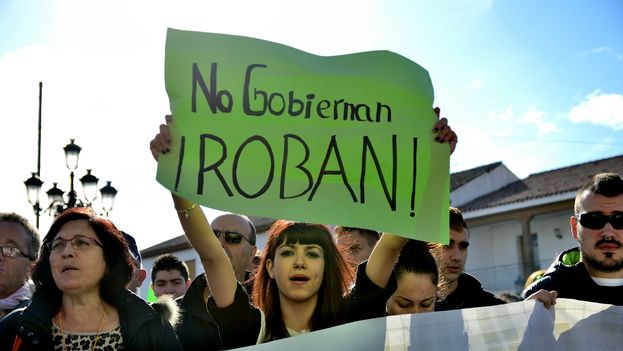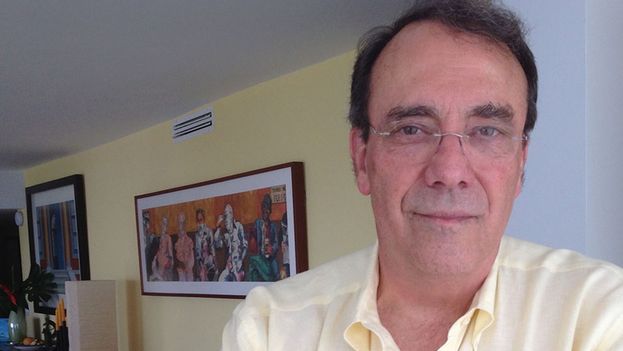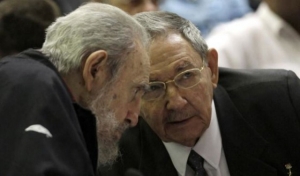REINALDO ESCOBAR, Havana, 24 June 2014 — Carlos Alberto Montaner has long been a kind of black beast in the official Cuban government propaganda. Accused of being a terrorist, a CIA agent, an eminence gris in the world counterrevolution, in real life he is an academic and journalist who has been involved in politics without losing his vocation as a writer. In his home in Miami, in front of a window where the bipolar horizon is divided between Cuba and Florida, he responds to 14ymedio’s questions.
Question: But in any event you have to please the readers?
Answer: The journalist is obliged to interpret what society wants. If you don’t become a person able to summarize and argue what society suspects, then you aren’t going to connect with society, with the readers. One thing I’ve learned over the years is that most people who read you are looking for corroboration of their opinions, the coherent organization of their opinions.
When you’ve managed to bring people’s emotions and beliefs to a comprehensible language, then you’ve become a successful journalist. Authoritarian elements lie when they say that journalists represent the interests of the owners. That’s not true. For the media to function it has to represent the opinions and interests of its readers, to be a spokesperson for a sector of society.
The massacres of Fidel Castro’s early days were repugnant to me and gave me the impression of a detestable person
Question: Were you born a liberal, have you always been a liberal, will you die a liberal?
Answer: I’ve had my evolution. For a very short time I was a revolutionary boy who believed in the Revolution, but almost immediately the massacres of Fidel Castro’s early days were repugnant to me and gave me the impression of a detestable person. No one who talks so many hours straight can be a reliable person at all. Later I felt like a social democrat. That lasted longer. The first lecture I gave I was very young, 18 or 19, it was about the supposed falsity of this affirmation that “the State was a bad administrator.” I had a period until the seventies when I thought the social democratic solution would be better.
When I moved to Spain the in 70s and lived the change intensely and approached the Spanish liberal groups, I discovered something that no one in Cuba knew, that was liberal thinking. It was the time when the triumph of Keynesian ideas, social democracy and all that, were sold.
Question: Do you think that it’s a false dilemma between social justice and freedom?
Answer: There is always a time when we must make decisions confronting this dilemma, but to begin, it’s very difficult for me today to accept that idea that there is an abstract thing that is social justice. I don’t know what that is, and I don’t know because in reality no one knows what that is. There are suppositions that a certain number of benefits correspond to a certain number of people and that there are some officials who arbitrarily are those who know what those benefits are and to whom they’re assigned, and on top of that these officials make decisions in this direction and what they do are atrocities and destroy the possibility of creating wealth.
So, that said, what’s important is that everyone has equal opportunities to compete, and that everyone has the opportunity to study and the best possible health. You can’t ask a malnourished child who comes from a very poor home to compete when his possibilities are limited compared to others. We have to create the conditions where people can achieve their dreams and pursue their objectives, which also change with the evolution of one’s live. Everyone has his projects. There are those who want to be a philosopher, and there are those who want to be an entrepreneur. Nobody has the right to decide what is best for others.
That’s one of the great atrocities of socialism: the existence of a political elite who are the ones who know what happiness is, what should be the price of things, what we should consume, what we should study, what work we should do. Freedom consists precisely of this, the power to make decisions. The more decisions you can make, the freer you are.
I’m interested in participating in whatever change process there is in Cuba, but I believe that (this) process must be in the hands of the young people inside Cuba
Question: All signs indicate that from now on you are going to dedicate more time to literature than to politics. Is this true?
Answer: Literature, writing books of fiction, is an activity more appropriate for seniors than is politics, which is an activity for much younger people.
Question: Does that mean you’ve given up politics?
Answer: No, I never gave up politics in the same way that I never chose it. The political vocation comes naturally. I have a political vocation and I’m interested in participating in whatever change process there is in Cuba, but I believe that any process of this kind must be in the hands of the young people inside Cuba.
Question: You have a clear formulation of the kind of journalist and politician you want to be. Have you defined your style as a novelist?
Answer: I think the language should be used to the benefit of the reader. I don’t believe in baroque literature nor in the value of the phrase that isn’t understood. Gongorism has never interested me. Lezama Lima seems to me to be a very respectable figure, but his writing doesn’t interest me, and I mention this as a paradigm of the kind of literature that takes its quality and academic and literary range as a consequence of its difficulty. What’s important to me is the ability to say things in an elegant, creative but transparent way, with regards to form.
Then there are the technical aspects of the use of grammatical persons, the use precise adjectives, in short, the management of the language. I have published five novels, I have started a sixth. In the first. Perro mundo (Dog World), I related something I experienced and that is basically the story of people who are faced with a terrible choice: either submit or die. There is a character who decides to die rather than submit because his unique ability to act as a human being is to say no, to refuse what they want to impose on him, because to accept it would make him an animal.
From there what has interested me is to tell stories with fictional characters placed in realistic scenarios. La trama (The Plot) plays with the story of the bombing of the Maine, the battleship that exploded in Havana Bay and prompted the intervention of the United States in the War of Independence.
Julio Lobo, the Cuban sugar magnate who collected curious objects and documents – among them the act of the independence of Chile and things like that – had a sworn statement from a group of anarchists in the early twentieth century where they claimed that they were the ones who carried out the explosion. From this data I construct that story, how it was that some anarchists blew up the Maine in April 1898. I use the framework of how they anarchists worked in the U.S. and from there developed the plot.
Years passed dedicated to political and business activities, I picked up the novel again with La mujer del coronel (The Colonel’s Wife), a true story where there was an element of personal challenge. I wanted to explore what is most difficult, which is erotic language, difficult because when people take off their clothes they say things that aren’t very literary and that can be taken as obscene. You move between kitsch and vulgarity. In this case there were two elements, I wanted to tell the story of what seems to me the worst horror of the Cuban Revolution is the affective control of individuals. To decide who you can love and who you can’t, and to punish you when you part from what they believe.
When the government decided in the early 60s that whose who stayed in Cuba shouldn’t have relations with family members who left the country, this was a terrible crime. To give the order that you can’t love your mother, a brother, your friends, this is terrible. I had had that experience in Puerto Rico when a delegation of Cuban athletes came under the direction of José Llanusa, the director of the National Institute of Sports, Physical Education and Recreation, who has been my friend and my basketball coach.
The mother of this man, who became the Minister of Education in Cuba, had been exiled to Puerto Rico and as she was gravely ill she wanted to see her son before she died. But he decided he wouldn’t go see her because he preferred to behave as a revolutionary. This desire to pretend to become the master of human emotions, against which I have always rebelled, is what I wanted to relate in the story of this man, a senior army officer whom they ordered to separate from his wife because there was evidence that she had been unfaithful.
I’d love to have coffee with you at 14ymedio’s offices (but) I think I’ll die without returning to Cuba
The fourth novel is Otra vez adíos (Goodbye Again), which is my favorite. I read once that every ten years Freud arranged to have a portrait done, and this is the story of Freud’s portrait painter, who was Jewish, who had to flee Germany and ended up in Cuba. He ends up having to say goodbye again when the Cuban Revolution comes and he goes to New York.
Tiempo de canallas, which owes a debt to Otra vez adiós, is out of print. It has a chapter about the Cold War, which relates how an anti-communist front was formed on the island with Salvador de Maradiaga and Julian Gorqueno who, in Cuba, counted on Raul Roa. It was the era when Havana celebrated the Congress for Cultural Freedom. I realized that this story of the Battle of Ideas between the Soviet Union and the United States was so extraordinary that it deserved to be addressed as a separate subject in another book.
Tiempo de canallas, is a political thriller set in the time when the Central Intelligence Agency was created. It narrates the nature of those world peace congresses that rested on the propaganda concept with a binary structure where there were good communists and evil capitalists… but it doesn’t tell more because it’s a thriller.
Question. Would you like to go back to Cuba?
Answer. Yes, I would. I am nothing other than Cuban, although I have two other nationalities, the Spanish and American. I left the island at 18 and now I’m 71. I would like to participate in the reconstruction of Cuba, I’d love to have coffee with you at 14ymedio’s offices, stroll through the places of my childhood or the ruins of the places of my childhood. I grew up on Tejadillo street in Old Havana, it was a nice place where you could hear the bells of the Cathedral…
Question. Do you think that will be possible?
Answer. No. I think I will die without returning to Cuba.

![]() 14ymedio, Carlos Alberto Montaner, 25 April 2015 – Mexico and corruption are two words that always go hand in glove, or as the Columbians mischievously say, “grab each other’s peepees.”
14ymedio, Carlos Alberto Montaner, 25 April 2015 – Mexico and corruption are two words that always go hand in glove, or as the Columbians mischievously say, “grab each other’s peepees.”


